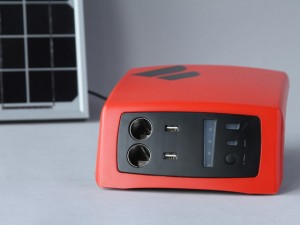Power to the Powerless
-
-
slice.mit.edu
Filed Under
Recommended

Most vacation packing ends the same way: Cell phone…check. iPod…check. iPad…check. Wait…the chargers!
In the U.S., charging electronic devices is an afterthought. So imagine an environment where great distances need to be travelled just to charge a cellphone.
In many parts of Africa, access to reliable power is particularly challenging. A startup company with MIT roots, Fenix International, is hoping solar power can help remedy that problem.
Fenix's product, the ReadySet Solar Kit, uses renewable energy to power up to 10 cellphones or provide lighting for over 30 hours on a full charge. In additional to solar power, the system allows charging from other non-carbon sources including bicycle generators and micro-wind turbines.
The company's COO is Brian Warshawsky SM '98, and an anonymous MIT alumnus provided part of Fenix's initial funding.
After spending five years in iPod operations at Apple, Warshawsky joined the One Laptop Per Child initiative. His team investigated off-grid power options, ultimately settling on pull-cord generation.
"We were not able to commercialize the pull-chord technology," he says. "But we realized that there are a huge number of people with cellphones living off the grid who badly need access to electricity."
Members of that group helped form Fenix. They switched their focus to smart battery technology, such as solar power, and focused on ease of use.
"Most existing systems required installation by a trained technician, and regular servicing." Warshawsky said. "We realized that to reach the scale needed to begin addressing the problem, we needed to create a device that was very easy to install and operate."
Initial development began in 2009 when the San Francisco-based company conducted a series of field studies in Uganda. The product was commercialized in December 2011 through a partnership with MTN Uganda, a branch of Africa's largest mobile telecom. More than 2,000 kits have been distributed in Uganda, including one to a Ugandan woman who is operating a micro-utility business that allows community members to charge electronic devices.
"People are going to great lengths to keep their phones charged," Warshawsky says. "As people have more ready access to power, they'll use their cell phones more. It's better for the community and for the telecom."
Warshawsky hopes the solar kits can eventually help replace kerosene lamps, which are dangerous and expensive to operate. Fenix is also determining whether a U.S. market exists for the product.
The company's Kickstarter campaign, which ends August 10, has far exceeded its $20,000 goal. It's new objective is $100,000, which would allow Fenix to open a second African office in Rwanda.







